BAC 305: Royal Commission Essay on Banking and Finance Misconduct
VerifiedAdded on 2023/06/03
|13
|3809
|207
Essay
AI Summary
This essay provides a comprehensive analysis of the Australian Royal Commission into the banking and finance sectors. It begins with an introduction to the Royal Commission, outlining its purpose, background, and the powers granted to it. The essay explores the rationale behind the commission, focusing on misconduct in superannuation, banking, and financial services. It examines the corporate governance within the banking industry, highlighting its unique aspects and the responsibilities of top management. The findings of the commission, including specific instances of misconduct and conflicts of interest, are detailed. The essay also discusses corporate culture and remuneration within banking institutions and their impact on employee behavior and ethical practices. It assesses the impact of the Royal Commission, including its influence on corporate social responsibility and accountability. The essay concludes with a review of the commission's recommendations and their potential to address misconduct and improve practices in the banking sector, including the role of regulatory bodies like ASIC and APRA, while also providing a critical analysis of the resistance faced by the commission from various stakeholders.
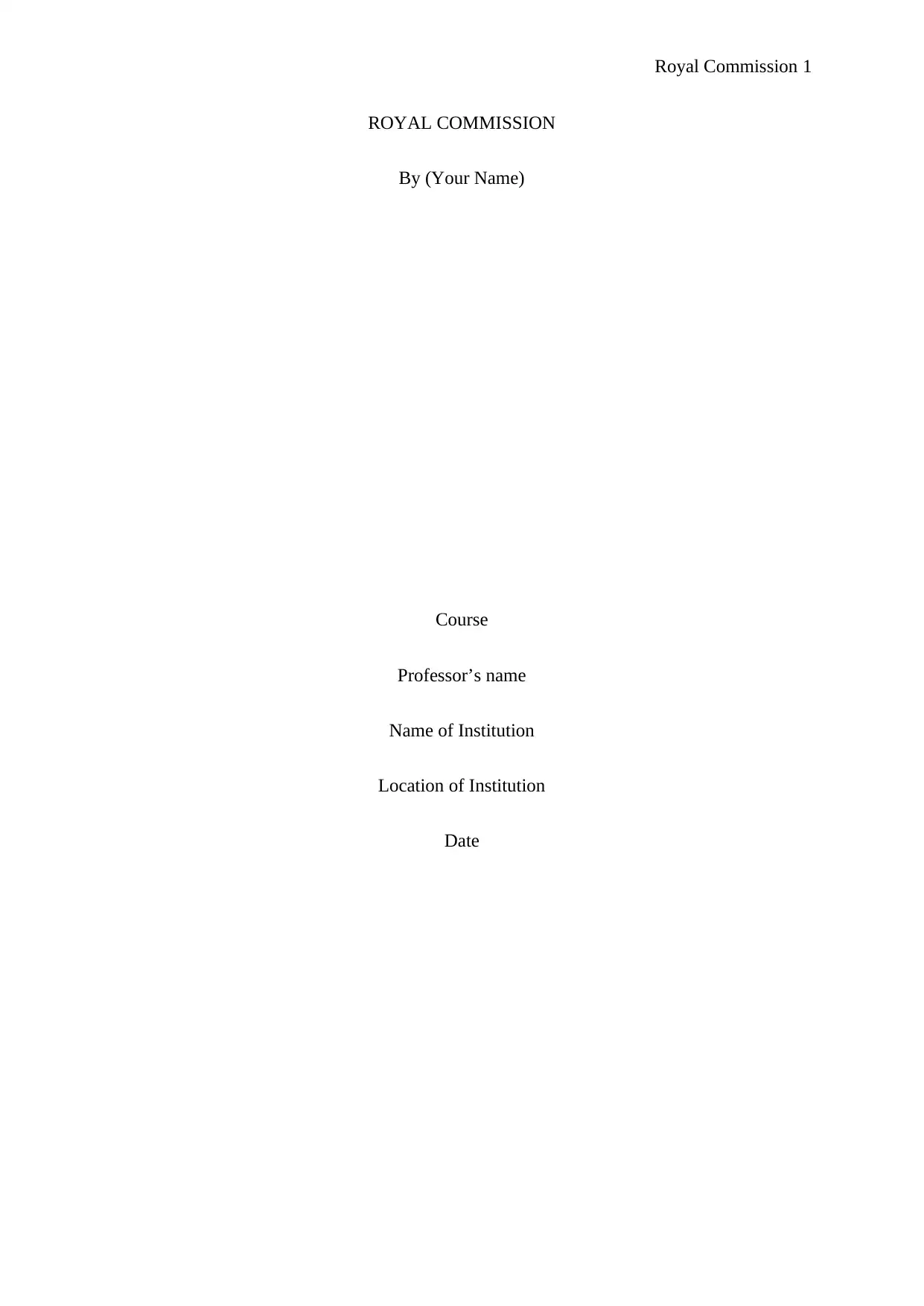
Royal Commission 1
ROYAL COMMISSION
By (Your Name)
Course
Professor’s name
Name of Institution
Location of Institution
Date
ROYAL COMMISSION
By (Your Name)
Course
Professor’s name
Name of Institution
Location of Institution
Date
Paraphrase This Document
Need a fresh take? Get an instant paraphrase of this document with our AI Paraphraser
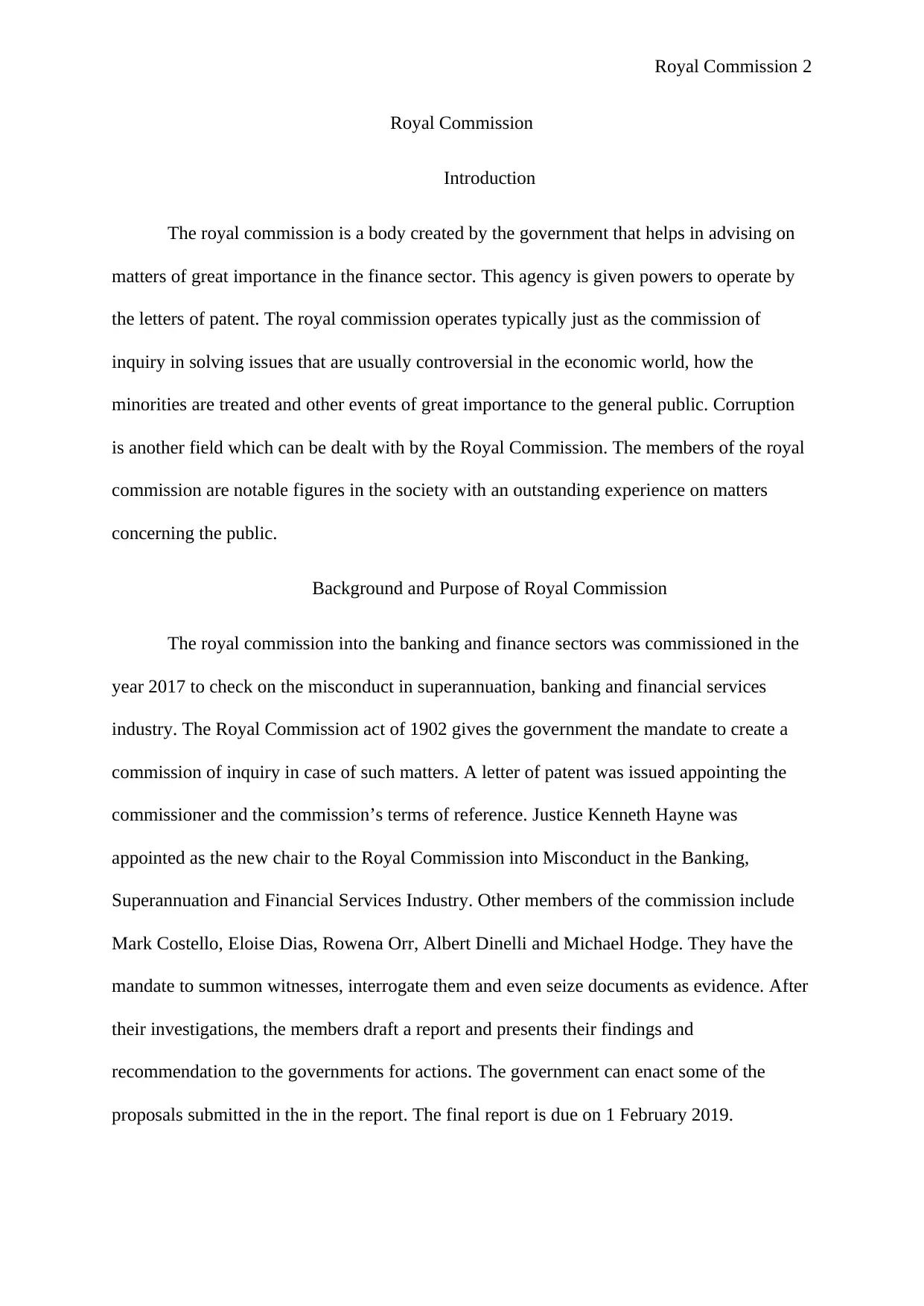
Royal Commission 2
Royal Commission
Introduction
The royal commission is a body created by the government that helps in advising on
matters of great importance in the finance sector. This agency is given powers to operate by
the letters of patent. The royal commission operates typically just as the commission of
inquiry in solving issues that are usually controversial in the economic world, how the
minorities are treated and other events of great importance to the general public. Corruption
is another field which can be dealt with by the Royal Commission. The members of the royal
commission are notable figures in the society with an outstanding experience on matters
concerning the public.
Background and Purpose of Royal Commission
The royal commission into the banking and finance sectors was commissioned in the
year 2017 to check on the misconduct in superannuation, banking and financial services
industry. The Royal Commission act of 1902 gives the government the mandate to create a
commission of inquiry in case of such matters. A letter of patent was issued appointing the
commissioner and the commission’s terms of reference. Justice Kenneth Hayne was
appointed as the new chair to the Royal Commission into Misconduct in the Banking,
Superannuation and Financial Services Industry. Other members of the commission include
Mark Costello, Eloise Dias, Rowena Orr, Albert Dinelli and Michael Hodge. They have the
mandate to summon witnesses, interrogate them and even seize documents as evidence. After
their investigations, the members draft a report and presents their findings and
recommendation to the governments for actions. The government can enact some of the
proposals submitted in the in the report. The final report is due on 1 February 2019.
Royal Commission
Introduction
The royal commission is a body created by the government that helps in advising on
matters of great importance in the finance sector. This agency is given powers to operate by
the letters of patent. The royal commission operates typically just as the commission of
inquiry in solving issues that are usually controversial in the economic world, how the
minorities are treated and other events of great importance to the general public. Corruption
is another field which can be dealt with by the Royal Commission. The members of the royal
commission are notable figures in the society with an outstanding experience on matters
concerning the public.
Background and Purpose of Royal Commission
The royal commission into the banking and finance sectors was commissioned in the
year 2017 to check on the misconduct in superannuation, banking and financial services
industry. The Royal Commission act of 1902 gives the government the mandate to create a
commission of inquiry in case of such matters. A letter of patent was issued appointing the
commissioner and the commission’s terms of reference. Justice Kenneth Hayne was
appointed as the new chair to the Royal Commission into Misconduct in the Banking,
Superannuation and Financial Services Industry. Other members of the commission include
Mark Costello, Eloise Dias, Rowena Orr, Albert Dinelli and Michael Hodge. They have the
mandate to summon witnesses, interrogate them and even seize documents as evidence. After
their investigations, the members draft a report and presents their findings and
recommendation to the governments for actions. The government can enact some of the
proposals submitted in the in the report. The final report is due on 1 February 2019.
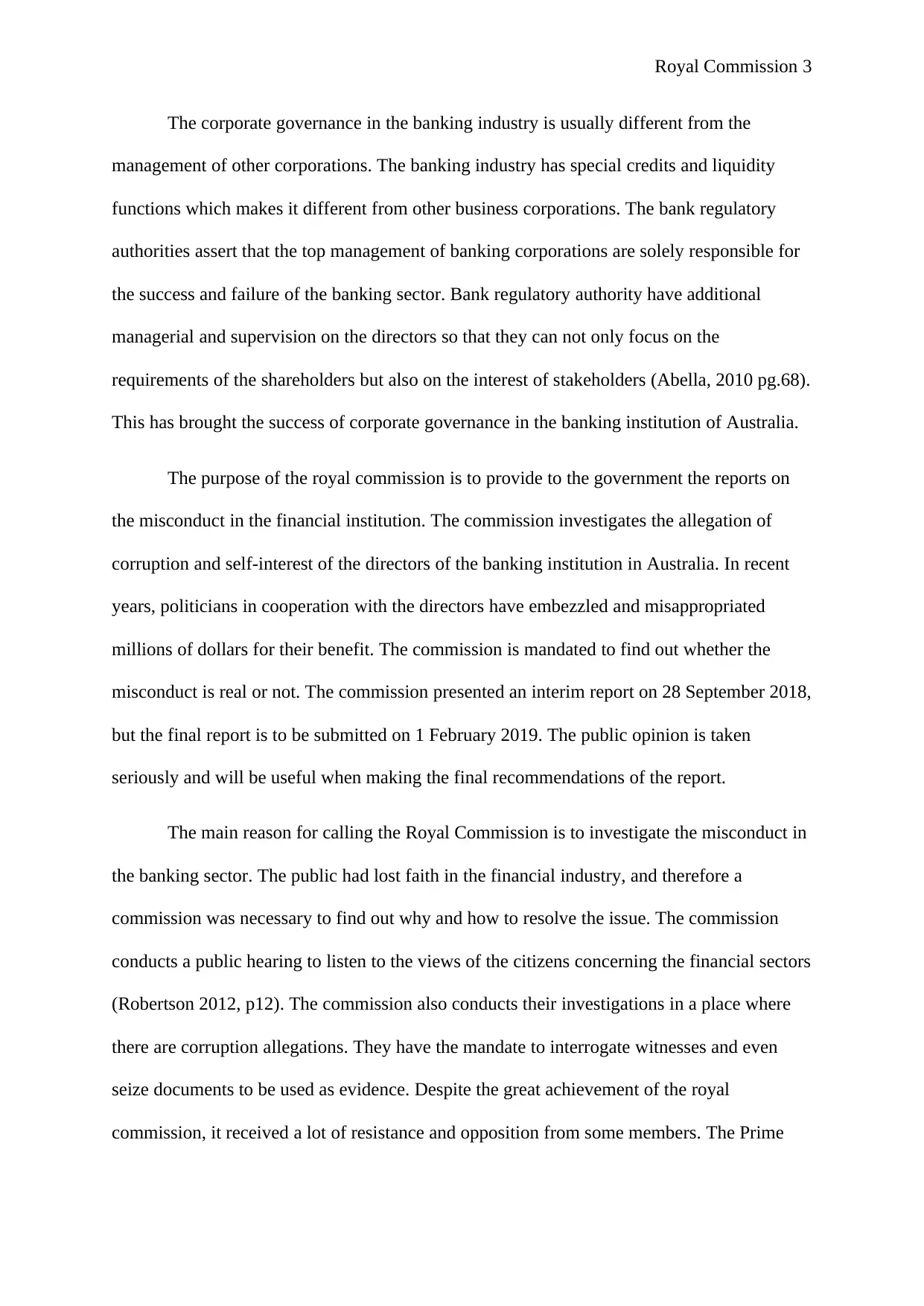
Royal Commission 3
The corporate governance in the banking industry is usually different from the
management of other corporations. The banking industry has special credits and liquidity
functions which makes it different from other business corporations. The bank regulatory
authorities assert that the top management of banking corporations are solely responsible for
the success and failure of the banking sector. Bank regulatory authority have additional
managerial and supervision on the directors so that they can not only focus on the
requirements of the shareholders but also on the interest of stakeholders (Abella, 2010 pg.68).
This has brought the success of corporate governance in the banking institution of Australia.
The purpose of the royal commission is to provide to the government the reports on
the misconduct in the financial institution. The commission investigates the allegation of
corruption and self-interest of the directors of the banking institution in Australia. In recent
years, politicians in cooperation with the directors have embezzled and misappropriated
millions of dollars for their benefit. The commission is mandated to find out whether the
misconduct is real or not. The commission presented an interim report on 28 September 2018,
but the final report is to be submitted on 1 February 2019. The public opinion is taken
seriously and will be useful when making the final recommendations of the report.
The main reason for calling the Royal Commission is to investigate the misconduct in
the banking sector. The public had lost faith in the financial industry, and therefore a
commission was necessary to find out why and how to resolve the issue. The commission
conducts a public hearing to listen to the views of the citizens concerning the financial sectors
(Robertson 2012, p12). The commission also conducts their investigations in a place where
there are corruption allegations. They have the mandate to interrogate witnesses and even
seize documents to be used as evidence. Despite the great achievement of the royal
commission, it received a lot of resistance and opposition from some members. The Prime
The corporate governance in the banking industry is usually different from the
management of other corporations. The banking industry has special credits and liquidity
functions which makes it different from other business corporations. The bank regulatory
authorities assert that the top management of banking corporations are solely responsible for
the success and failure of the banking sector. Bank regulatory authority have additional
managerial and supervision on the directors so that they can not only focus on the
requirements of the shareholders but also on the interest of stakeholders (Abella, 2010 pg.68).
This has brought the success of corporate governance in the banking institution of Australia.
The purpose of the royal commission is to provide to the government the reports on
the misconduct in the financial institution. The commission investigates the allegation of
corruption and self-interest of the directors of the banking institution in Australia. In recent
years, politicians in cooperation with the directors have embezzled and misappropriated
millions of dollars for their benefit. The commission is mandated to find out whether the
misconduct is real or not. The commission presented an interim report on 28 September 2018,
but the final report is to be submitted on 1 February 2019. The public opinion is taken
seriously and will be useful when making the final recommendations of the report.
The main reason for calling the Royal Commission is to investigate the misconduct in
the banking sector. The public had lost faith in the financial industry, and therefore a
commission was necessary to find out why and how to resolve the issue. The commission
conducts a public hearing to listen to the views of the citizens concerning the financial sectors
(Robertson 2012, p12). The commission also conducts their investigations in a place where
there are corruption allegations. They have the mandate to interrogate witnesses and even
seize documents to be used as evidence. Despite the great achievement of the royal
commission, it received a lot of resistance and opposition from some members. The Prime
⊘ This is a preview!⊘
Do you want full access?
Subscribe today to unlock all pages.

Trusted by 1+ million students worldwide
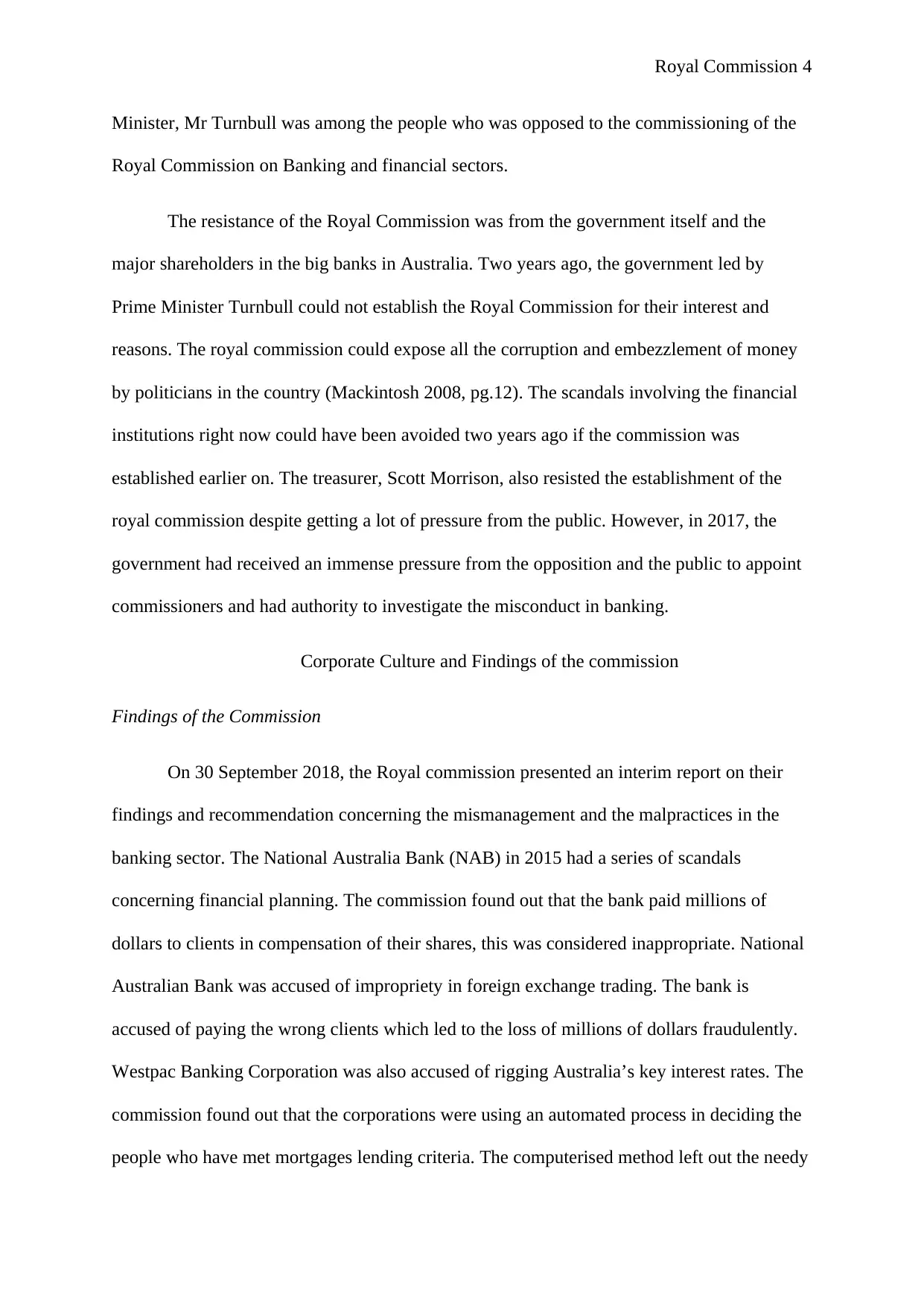
Royal Commission 4
Minister, Mr Turnbull was among the people who was opposed to the commissioning of the
Royal Commission on Banking and financial sectors.
The resistance of the Royal Commission was from the government itself and the
major shareholders in the big banks in Australia. Two years ago, the government led by
Prime Minister Turnbull could not establish the Royal Commission for their interest and
reasons. The royal commission could expose all the corruption and embezzlement of money
by politicians in the country (Mackintosh 2008, pg.12). The scandals involving the financial
institutions right now could have been avoided two years ago if the commission was
established earlier on. The treasurer, Scott Morrison, also resisted the establishment of the
royal commission despite getting a lot of pressure from the public. However, in 2017, the
government had received an immense pressure from the opposition and the public to appoint
commissioners and had authority to investigate the misconduct in banking.
Corporate Culture and Findings of the commission
Findings of the Commission
On 30 September 2018, the Royal commission presented an interim report on their
findings and recommendation concerning the mismanagement and the malpractices in the
banking sector. The National Australia Bank (NAB) in 2015 had a series of scandals
concerning financial planning. The commission found out that the bank paid millions of
dollars to clients in compensation of their shares, this was considered inappropriate. National
Australian Bank was accused of impropriety in foreign exchange trading. The bank is
accused of paying the wrong clients which led to the loss of millions of dollars fraudulently.
Westpac Banking Corporation was also accused of rigging Australia’s key interest rates. The
commission found out that the corporations were using an automated process in deciding the
people who have met mortgages lending criteria. The computerised method left out the needy
Minister, Mr Turnbull was among the people who was opposed to the commissioning of the
Royal Commission on Banking and financial sectors.
The resistance of the Royal Commission was from the government itself and the
major shareholders in the big banks in Australia. Two years ago, the government led by
Prime Minister Turnbull could not establish the Royal Commission for their interest and
reasons. The royal commission could expose all the corruption and embezzlement of money
by politicians in the country (Mackintosh 2008, pg.12). The scandals involving the financial
institutions right now could have been avoided two years ago if the commission was
established earlier on. The treasurer, Scott Morrison, also resisted the establishment of the
royal commission despite getting a lot of pressure from the public. However, in 2017, the
government had received an immense pressure from the opposition and the public to appoint
commissioners and had authority to investigate the misconduct in banking.
Corporate Culture and Findings of the commission
Findings of the Commission
On 30 September 2018, the Royal commission presented an interim report on their
findings and recommendation concerning the mismanagement and the malpractices in the
banking sector. The National Australia Bank (NAB) in 2015 had a series of scandals
concerning financial planning. The commission found out that the bank paid millions of
dollars to clients in compensation of their shares, this was considered inappropriate. National
Australian Bank was accused of impropriety in foreign exchange trading. The bank is
accused of paying the wrong clients which led to the loss of millions of dollars fraudulently.
Westpac Banking Corporation was also accused of rigging Australia’s key interest rates. The
commission found out that the corporations were using an automated process in deciding the
people who have met mortgages lending criteria. The computerised method left out the needy
Paraphrase This Document
Need a fresh take? Get an instant paraphrase of this document with our AI Paraphraser
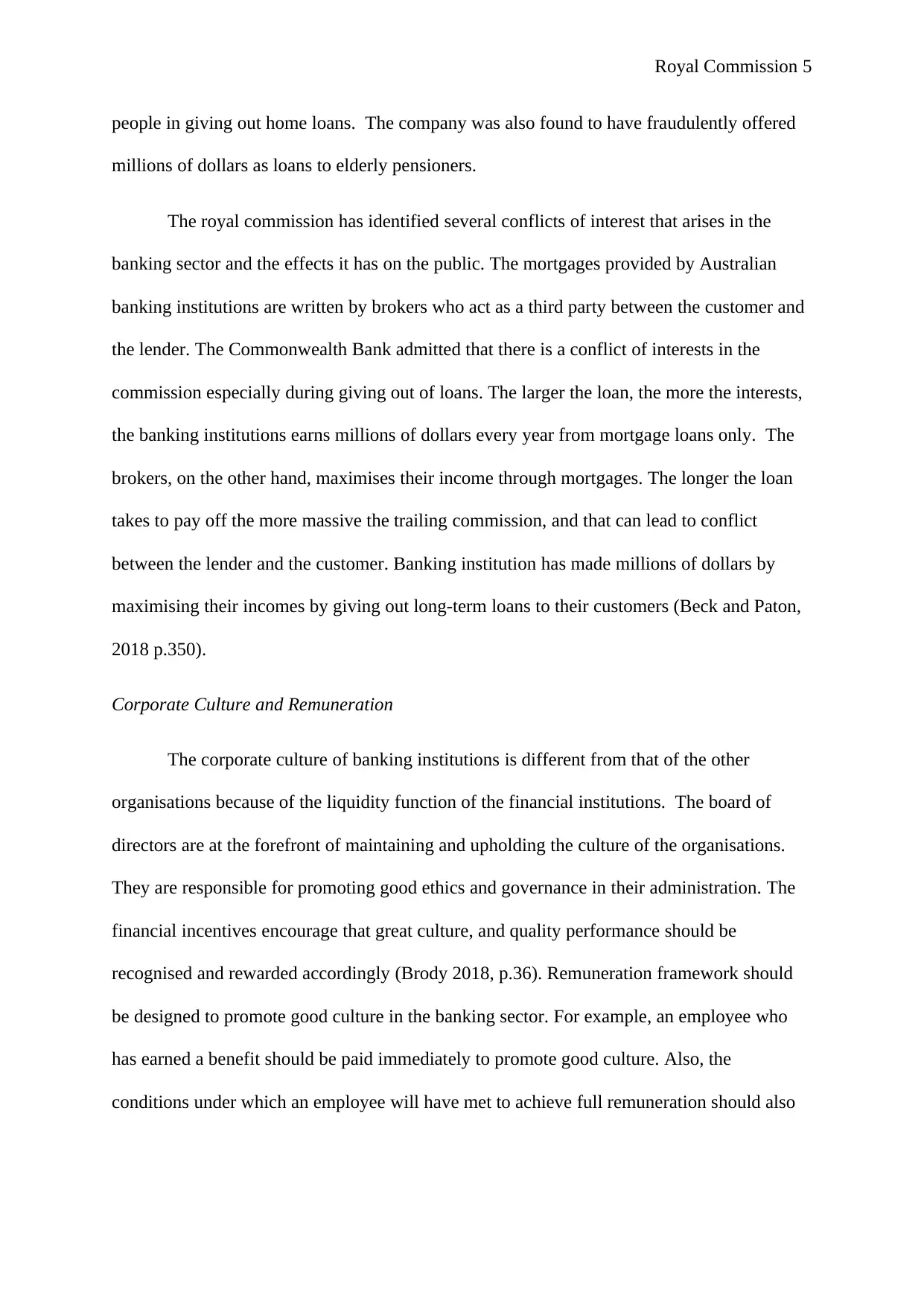
Royal Commission 5
people in giving out home loans. The company was also found to have fraudulently offered
millions of dollars as loans to elderly pensioners.
The royal commission has identified several conflicts of interest that arises in the
banking sector and the effects it has on the public. The mortgages provided by Australian
banking institutions are written by brokers who act as a third party between the customer and
the lender. The Commonwealth Bank admitted that there is a conflict of interests in the
commission especially during giving out of loans. The larger the loan, the more the interests,
the banking institutions earns millions of dollars every year from mortgage loans only. The
brokers, on the other hand, maximises their income through mortgages. The longer the loan
takes to pay off the more massive the trailing commission, and that can lead to conflict
between the lender and the customer. Banking institution has made millions of dollars by
maximising their incomes by giving out long-term loans to their customers (Beck and Paton,
2018 p.350).
Corporate Culture and Remuneration
The corporate culture of banking institutions is different from that of the other
organisations because of the liquidity function of the financial institutions. The board of
directors are at the forefront of maintaining and upholding the culture of the organisations.
They are responsible for promoting good ethics and governance in their administration. The
financial incentives encourage that great culture, and quality performance should be
recognised and rewarded accordingly (Brody 2018, p.36). Remuneration framework should
be designed to promote good culture in the banking sector. For example, an employee who
has earned a benefit should be paid immediately to promote good culture. Also, the
conditions under which an employee will have met to achieve full remuneration should also
people in giving out home loans. The company was also found to have fraudulently offered
millions of dollars as loans to elderly pensioners.
The royal commission has identified several conflicts of interest that arises in the
banking sector and the effects it has on the public. The mortgages provided by Australian
banking institutions are written by brokers who act as a third party between the customer and
the lender. The Commonwealth Bank admitted that there is a conflict of interests in the
commission especially during giving out of loans. The larger the loan, the more the interests,
the banking institutions earns millions of dollars every year from mortgage loans only. The
brokers, on the other hand, maximises their income through mortgages. The longer the loan
takes to pay off the more massive the trailing commission, and that can lead to conflict
between the lender and the customer. Banking institution has made millions of dollars by
maximising their incomes by giving out long-term loans to their customers (Beck and Paton,
2018 p.350).
Corporate Culture and Remuneration
The corporate culture of banking institutions is different from that of the other
organisations because of the liquidity function of the financial institutions. The board of
directors are at the forefront of maintaining and upholding the culture of the organisations.
They are responsible for promoting good ethics and governance in their administration. The
financial incentives encourage that great culture, and quality performance should be
recognised and rewarded accordingly (Brody 2018, p.36). Remuneration framework should
be designed to promote good culture in the banking sector. For example, an employee who
has earned a benefit should be paid immediately to promote good culture. Also, the
conditions under which an employee will have met to achieve full remuneration should also
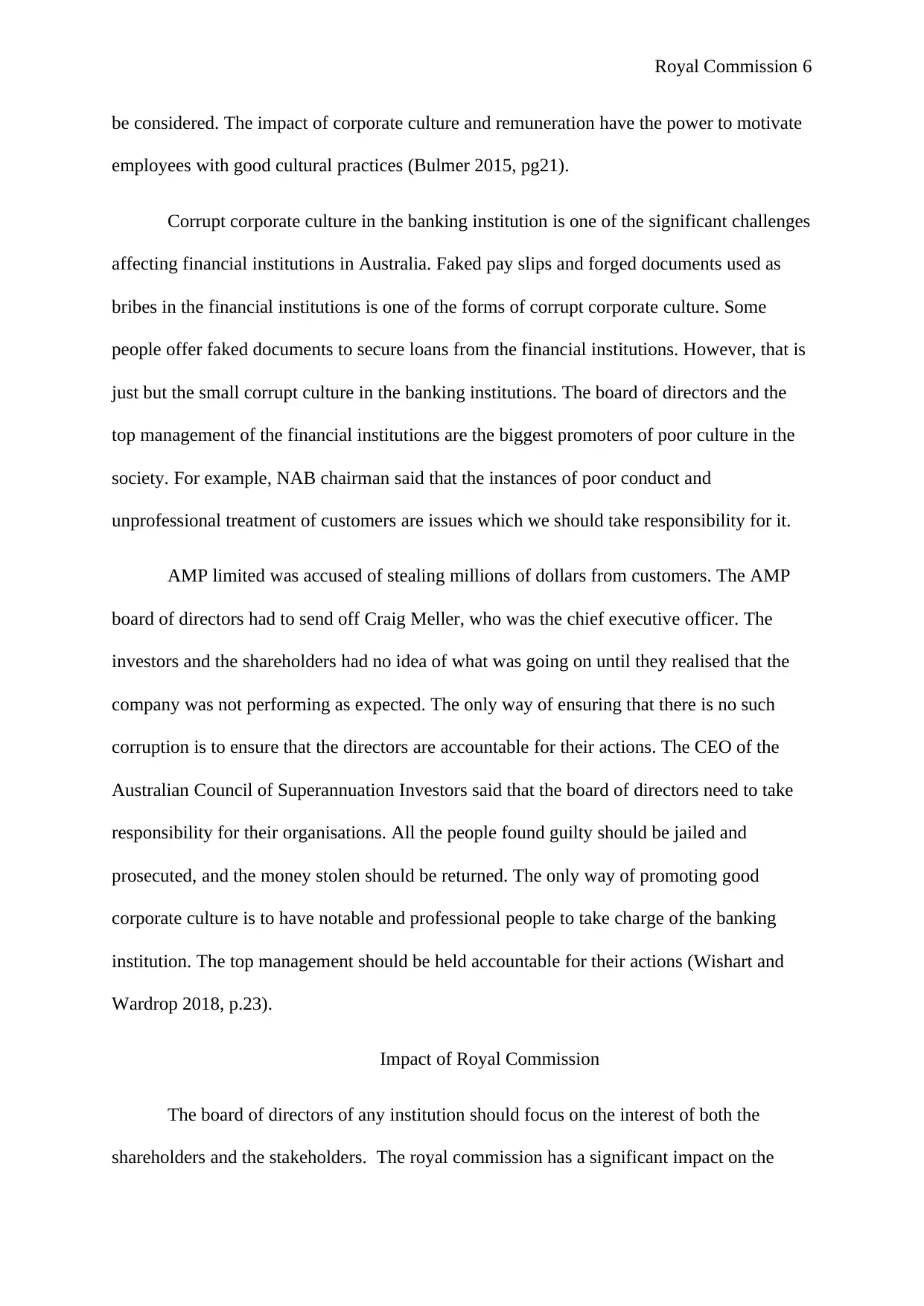
Royal Commission 6
be considered. The impact of corporate culture and remuneration have the power to motivate
employees with good cultural practices (Bulmer 2015, pg21).
Corrupt corporate culture in the banking institution is one of the significant challenges
affecting financial institutions in Australia. Faked pay slips and forged documents used as
bribes in the financial institutions is one of the forms of corrupt corporate culture. Some
people offer faked documents to secure loans from the financial institutions. However, that is
just but the small corrupt culture in the banking institutions. The board of directors and the
top management of the financial institutions are the biggest promoters of poor culture in the
society. For example, NAB chairman said that the instances of poor conduct and
unprofessional treatment of customers are issues which we should take responsibility for it.
AMP limited was accused of stealing millions of dollars from customers. The AMP
board of directors had to send off Craig Meller, who was the chief executive officer. The
investors and the shareholders had no idea of what was going on until they realised that the
company was not performing as expected. The only way of ensuring that there is no such
corruption is to ensure that the directors are accountable for their actions. The CEO of the
Australian Council of Superannuation Investors said that the board of directors need to take
responsibility for their organisations. All the people found guilty should be jailed and
prosecuted, and the money stolen should be returned. The only way of promoting good
corporate culture is to have notable and professional people to take charge of the banking
institution. The top management should be held accountable for their actions (Wishart and
Wardrop 2018, p.23).
Impact of Royal Commission
The board of directors of any institution should focus on the interest of both the
shareholders and the stakeholders. The royal commission has a significant impact on the
be considered. The impact of corporate culture and remuneration have the power to motivate
employees with good cultural practices (Bulmer 2015, pg21).
Corrupt corporate culture in the banking institution is one of the significant challenges
affecting financial institutions in Australia. Faked pay slips and forged documents used as
bribes in the financial institutions is one of the forms of corrupt corporate culture. Some
people offer faked documents to secure loans from the financial institutions. However, that is
just but the small corrupt culture in the banking institutions. The board of directors and the
top management of the financial institutions are the biggest promoters of poor culture in the
society. For example, NAB chairman said that the instances of poor conduct and
unprofessional treatment of customers are issues which we should take responsibility for it.
AMP limited was accused of stealing millions of dollars from customers. The AMP
board of directors had to send off Craig Meller, who was the chief executive officer. The
investors and the shareholders had no idea of what was going on until they realised that the
company was not performing as expected. The only way of ensuring that there is no such
corruption is to ensure that the directors are accountable for their actions. The CEO of the
Australian Council of Superannuation Investors said that the board of directors need to take
responsibility for their organisations. All the people found guilty should be jailed and
prosecuted, and the money stolen should be returned. The only way of promoting good
corporate culture is to have notable and professional people to take charge of the banking
institution. The top management should be held accountable for their actions (Wishart and
Wardrop 2018, p.23).
Impact of Royal Commission
The board of directors of any institution should focus on the interest of both the
shareholders and the stakeholders. The royal commission has a significant impact on the
⊘ This is a preview!⊘
Do you want full access?
Subscribe today to unlock all pages.

Trusted by 1+ million students worldwide
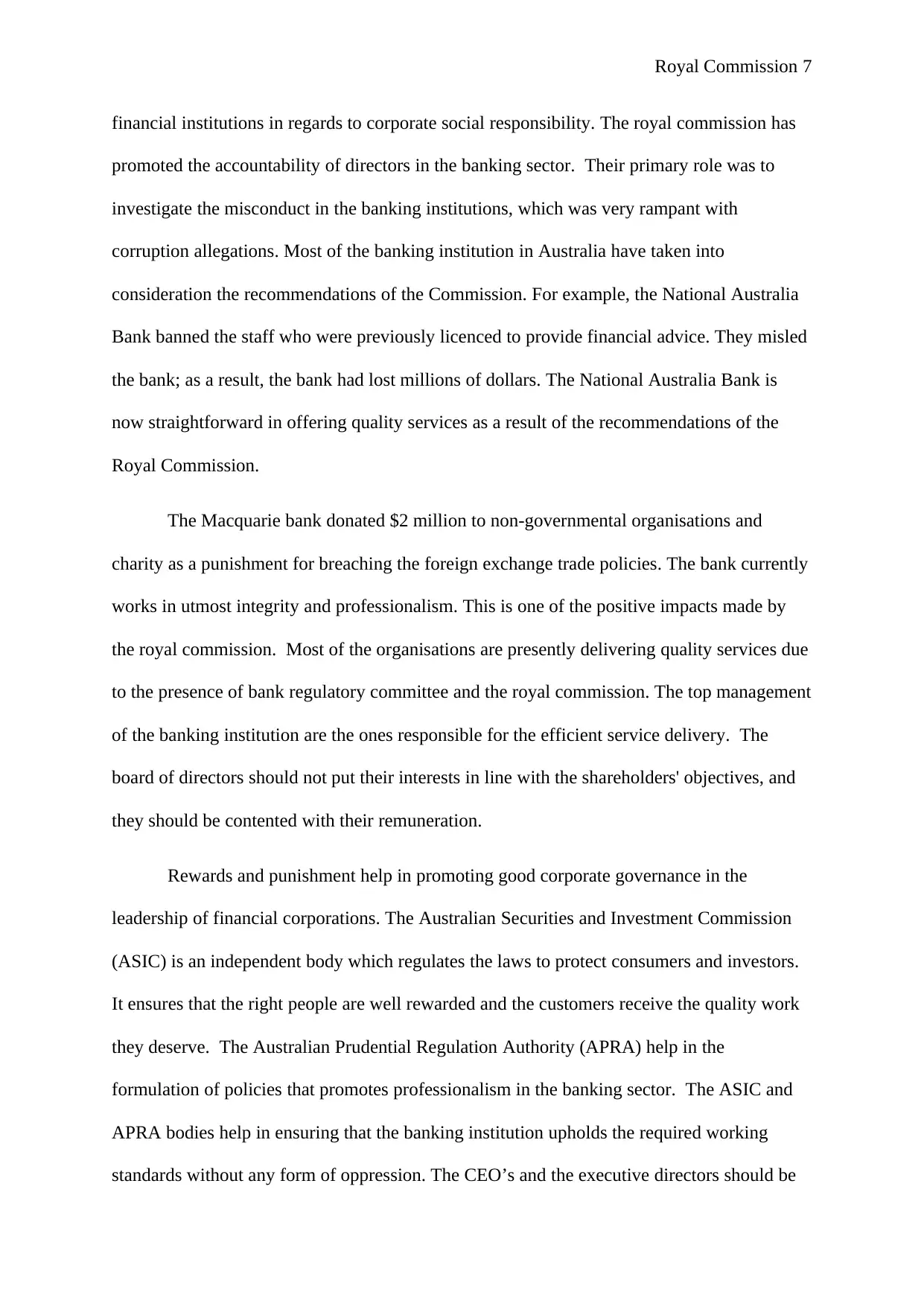
Royal Commission 7
financial institutions in regards to corporate social responsibility. The royal commission has
promoted the accountability of directors in the banking sector. Their primary role was to
investigate the misconduct in the banking institutions, which was very rampant with
corruption allegations. Most of the banking institution in Australia have taken into
consideration the recommendations of the Commission. For example, the National Australia
Bank banned the staff who were previously licenced to provide financial advice. They misled
the bank; as a result, the bank had lost millions of dollars. The National Australia Bank is
now straightforward in offering quality services as a result of the recommendations of the
Royal Commission.
The Macquarie bank donated $2 million to non-governmental organisations and
charity as a punishment for breaching the foreign exchange trade policies. The bank currently
works in utmost integrity and professionalism. This is one of the positive impacts made by
the royal commission. Most of the organisations are presently delivering quality services due
to the presence of bank regulatory committee and the royal commission. The top management
of the banking institution are the ones responsible for the efficient service delivery. The
board of directors should not put their interests in line with the shareholders' objectives, and
they should be contented with their remuneration.
Rewards and punishment help in promoting good corporate governance in the
leadership of financial corporations. The Australian Securities and Investment Commission
(ASIC) is an independent body which regulates the laws to protect consumers and investors.
It ensures that the right people are well rewarded and the customers receive the quality work
they deserve. The Australian Prudential Regulation Authority (APRA) help in the
formulation of policies that promotes professionalism in the banking sector. The ASIC and
APRA bodies help in ensuring that the banking institution upholds the required working
standards without any form of oppression. The CEO’s and the executive directors should be
financial institutions in regards to corporate social responsibility. The royal commission has
promoted the accountability of directors in the banking sector. Their primary role was to
investigate the misconduct in the banking institutions, which was very rampant with
corruption allegations. Most of the banking institution in Australia have taken into
consideration the recommendations of the Commission. For example, the National Australia
Bank banned the staff who were previously licenced to provide financial advice. They misled
the bank; as a result, the bank had lost millions of dollars. The National Australia Bank is
now straightforward in offering quality services as a result of the recommendations of the
Royal Commission.
The Macquarie bank donated $2 million to non-governmental organisations and
charity as a punishment for breaching the foreign exchange trade policies. The bank currently
works in utmost integrity and professionalism. This is one of the positive impacts made by
the royal commission. Most of the organisations are presently delivering quality services due
to the presence of bank regulatory committee and the royal commission. The top management
of the banking institution are the ones responsible for the efficient service delivery. The
board of directors should not put their interests in line with the shareholders' objectives, and
they should be contented with their remuneration.
Rewards and punishment help in promoting good corporate governance in the
leadership of financial corporations. The Australian Securities and Investment Commission
(ASIC) is an independent body which regulates the laws to protect consumers and investors.
It ensures that the right people are well rewarded and the customers receive the quality work
they deserve. The Australian Prudential Regulation Authority (APRA) help in the
formulation of policies that promotes professionalism in the banking sector. The ASIC and
APRA bodies help in ensuring that the banking institution upholds the required working
standards without any form of oppression. The CEO’s and the executive directors should be
Paraphrase This Document
Need a fresh take? Get an instant paraphrase of this document with our AI Paraphraser
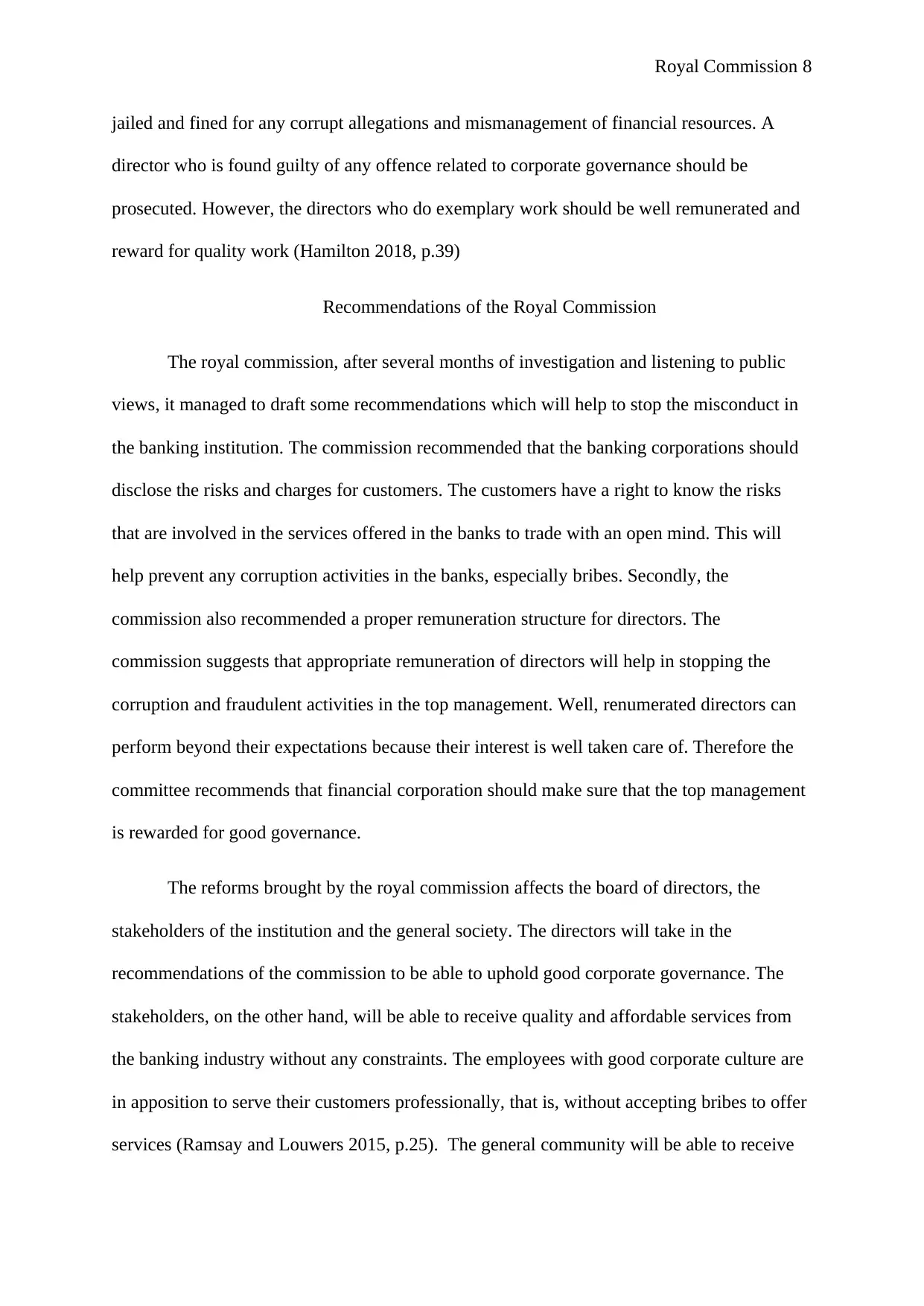
Royal Commission 8
jailed and fined for any corrupt allegations and mismanagement of financial resources. A
director who is found guilty of any offence related to corporate governance should be
prosecuted. However, the directors who do exemplary work should be well remunerated and
reward for quality work (Hamilton 2018, p.39)
Recommendations of the Royal Commission
The royal commission, after several months of investigation and listening to public
views, it managed to draft some recommendations which will help to stop the misconduct in
the banking institution. The commission recommended that the banking corporations should
disclose the risks and charges for customers. The customers have a right to know the risks
that are involved in the services offered in the banks to trade with an open mind. This will
help prevent any corruption activities in the banks, especially bribes. Secondly, the
commission also recommended a proper remuneration structure for directors. The
commission suggests that appropriate remuneration of directors will help in stopping the
corruption and fraudulent activities in the top management. Well, renumerated directors can
perform beyond their expectations because their interest is well taken care of. Therefore the
committee recommends that financial corporation should make sure that the top management
is rewarded for good governance.
The reforms brought by the royal commission affects the board of directors, the
stakeholders of the institution and the general society. The directors will take in the
recommendations of the commission to be able to uphold good corporate governance. The
stakeholders, on the other hand, will be able to receive quality and affordable services from
the banking industry without any constraints. The employees with good corporate culture are
in apposition to serve their customers professionally, that is, without accepting bribes to offer
services (Ramsay and Louwers 2015, p.25). The general community will be able to receive
jailed and fined for any corrupt allegations and mismanagement of financial resources. A
director who is found guilty of any offence related to corporate governance should be
prosecuted. However, the directors who do exemplary work should be well remunerated and
reward for quality work (Hamilton 2018, p.39)
Recommendations of the Royal Commission
The royal commission, after several months of investigation and listening to public
views, it managed to draft some recommendations which will help to stop the misconduct in
the banking institution. The commission recommended that the banking corporations should
disclose the risks and charges for customers. The customers have a right to know the risks
that are involved in the services offered in the banks to trade with an open mind. This will
help prevent any corruption activities in the banks, especially bribes. Secondly, the
commission also recommended a proper remuneration structure for directors. The
commission suggests that appropriate remuneration of directors will help in stopping the
corruption and fraudulent activities in the top management. Well, renumerated directors can
perform beyond their expectations because their interest is well taken care of. Therefore the
committee recommends that financial corporation should make sure that the top management
is rewarded for good governance.
The reforms brought by the royal commission affects the board of directors, the
stakeholders of the institution and the general society. The directors will take in the
recommendations of the commission to be able to uphold good corporate governance. The
stakeholders, on the other hand, will be able to receive quality and affordable services from
the banking industry without any constraints. The employees with good corporate culture are
in apposition to serve their customers professionally, that is, without accepting bribes to offer
services (Ramsay and Louwers 2015, p.25). The general community will be able to receive
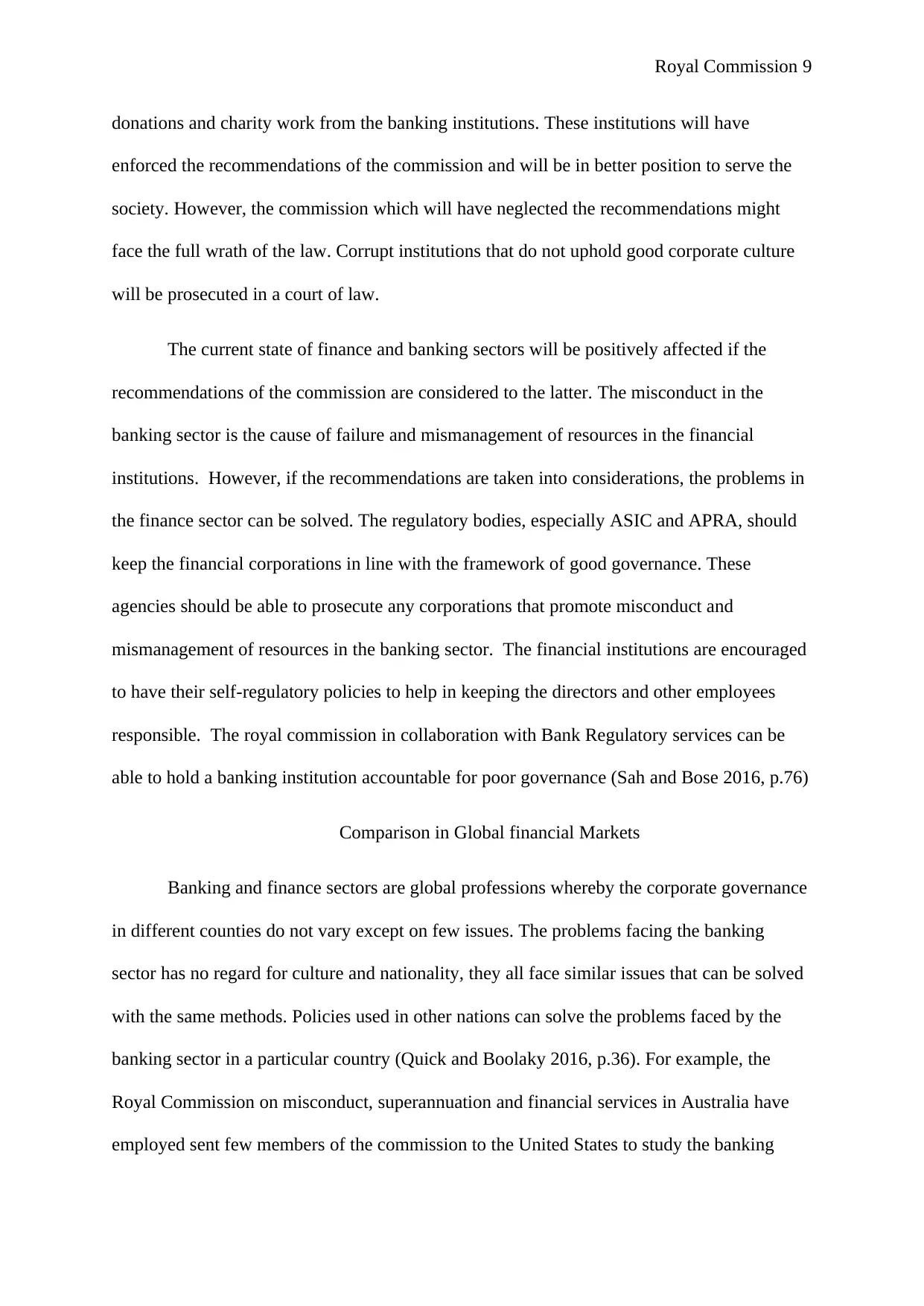
Royal Commission 9
donations and charity work from the banking institutions. These institutions will have
enforced the recommendations of the commission and will be in better position to serve the
society. However, the commission which will have neglected the recommendations might
face the full wrath of the law. Corrupt institutions that do not uphold good corporate culture
will be prosecuted in a court of law.
The current state of finance and banking sectors will be positively affected if the
recommendations of the commission are considered to the latter. The misconduct in the
banking sector is the cause of failure and mismanagement of resources in the financial
institutions. However, if the recommendations are taken into considerations, the problems in
the finance sector can be solved. The regulatory bodies, especially ASIC and APRA, should
keep the financial corporations in line with the framework of good governance. These
agencies should be able to prosecute any corporations that promote misconduct and
mismanagement of resources in the banking sector. The financial institutions are encouraged
to have their self-regulatory policies to help in keeping the directors and other employees
responsible. The royal commission in collaboration with Bank Regulatory services can be
able to hold a banking institution accountable for poor governance (Sah and Bose 2016, p.76)
Comparison in Global financial Markets
Banking and finance sectors are global professions whereby the corporate governance
in different counties do not vary except on few issues. The problems facing the banking
sector has no regard for culture and nationality, they all face similar issues that can be solved
with the same methods. Policies used in other nations can solve the problems faced by the
banking sector in a particular country (Quick and Boolaky 2016, p.36). For example, the
Royal Commission on misconduct, superannuation and financial services in Australia have
employed sent few members of the commission to the United States to study the banking
donations and charity work from the banking institutions. These institutions will have
enforced the recommendations of the commission and will be in better position to serve the
society. However, the commission which will have neglected the recommendations might
face the full wrath of the law. Corrupt institutions that do not uphold good corporate culture
will be prosecuted in a court of law.
The current state of finance and banking sectors will be positively affected if the
recommendations of the commission are considered to the latter. The misconduct in the
banking sector is the cause of failure and mismanagement of resources in the financial
institutions. However, if the recommendations are taken into considerations, the problems in
the finance sector can be solved. The regulatory bodies, especially ASIC and APRA, should
keep the financial corporations in line with the framework of good governance. These
agencies should be able to prosecute any corporations that promote misconduct and
mismanagement of resources in the banking sector. The financial institutions are encouraged
to have their self-regulatory policies to help in keeping the directors and other employees
responsible. The royal commission in collaboration with Bank Regulatory services can be
able to hold a banking institution accountable for poor governance (Sah and Bose 2016, p.76)
Comparison in Global financial Markets
Banking and finance sectors are global professions whereby the corporate governance
in different counties do not vary except on few issues. The problems facing the banking
sector has no regard for culture and nationality, they all face similar issues that can be solved
with the same methods. Policies used in other nations can solve the problems faced by the
banking sector in a particular country (Quick and Boolaky 2016, p.36). For example, the
Royal Commission on misconduct, superannuation and financial services in Australia have
employed sent few members of the commission to the United States to study the banking
⊘ This is a preview!⊘
Do you want full access?
Subscribe today to unlock all pages.

Trusted by 1+ million students worldwide
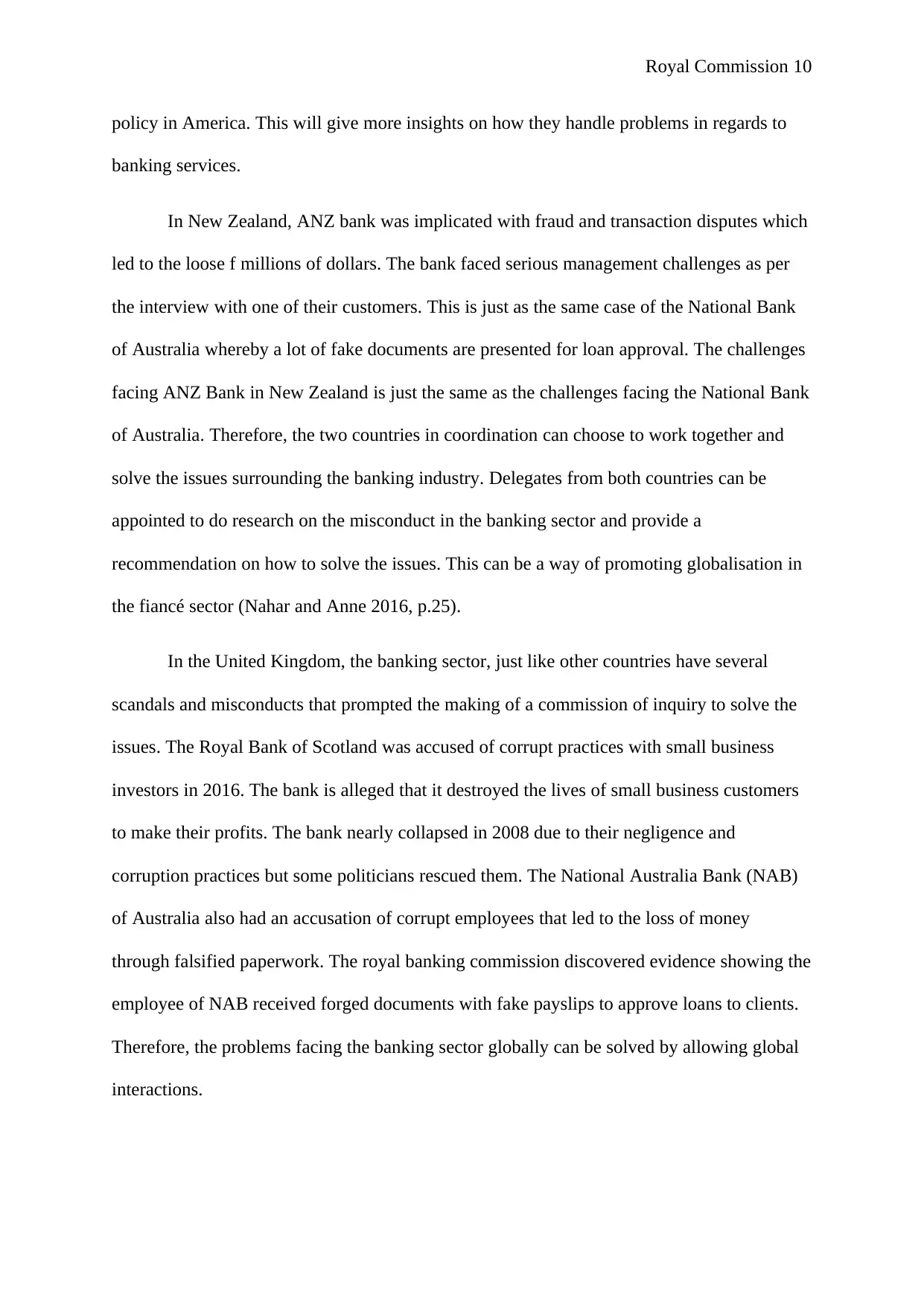
Royal Commission 10
policy in America. This will give more insights on how they handle problems in regards to
banking services.
In New Zealand, ANZ bank was implicated with fraud and transaction disputes which
led to the loose f millions of dollars. The bank faced serious management challenges as per
the interview with one of their customers. This is just as the same case of the National Bank
of Australia whereby a lot of fake documents are presented for loan approval. The challenges
facing ANZ Bank in New Zealand is just the same as the challenges facing the National Bank
of Australia. Therefore, the two countries in coordination can choose to work together and
solve the issues surrounding the banking industry. Delegates from both countries can be
appointed to do research on the misconduct in the banking sector and provide a
recommendation on how to solve the issues. This can be a way of promoting globalisation in
the fiancé sector (Nahar and Anne 2016, p.25).
In the United Kingdom, the banking sector, just like other countries have several
scandals and misconducts that prompted the making of a commission of inquiry to solve the
issues. The Royal Bank of Scotland was accused of corrupt practices with small business
investors in 2016. The bank is alleged that it destroyed the lives of small business customers
to make their profits. The bank nearly collapsed in 2008 due to their negligence and
corruption practices but some politicians rescued them. The National Australia Bank (NAB)
of Australia also had an accusation of corrupt employees that led to the loss of money
through falsified paperwork. The royal banking commission discovered evidence showing the
employee of NAB received forged documents with fake payslips to approve loans to clients.
Therefore, the problems facing the banking sector globally can be solved by allowing global
interactions.
policy in America. This will give more insights on how they handle problems in regards to
banking services.
In New Zealand, ANZ bank was implicated with fraud and transaction disputes which
led to the loose f millions of dollars. The bank faced serious management challenges as per
the interview with one of their customers. This is just as the same case of the National Bank
of Australia whereby a lot of fake documents are presented for loan approval. The challenges
facing ANZ Bank in New Zealand is just the same as the challenges facing the National Bank
of Australia. Therefore, the two countries in coordination can choose to work together and
solve the issues surrounding the banking industry. Delegates from both countries can be
appointed to do research on the misconduct in the banking sector and provide a
recommendation on how to solve the issues. This can be a way of promoting globalisation in
the fiancé sector (Nahar and Anne 2016, p.25).
In the United Kingdom, the banking sector, just like other countries have several
scandals and misconducts that prompted the making of a commission of inquiry to solve the
issues. The Royal Bank of Scotland was accused of corrupt practices with small business
investors in 2016. The bank is alleged that it destroyed the lives of small business customers
to make their profits. The bank nearly collapsed in 2008 due to their negligence and
corruption practices but some politicians rescued them. The National Australia Bank (NAB)
of Australia also had an accusation of corrupt employees that led to the loss of money
through falsified paperwork. The royal banking commission discovered evidence showing the
employee of NAB received forged documents with fake payslips to approve loans to clients.
Therefore, the problems facing the banking sector globally can be solved by allowing global
interactions.
Paraphrase This Document
Need a fresh take? Get an instant paraphrase of this document with our AI Paraphraser
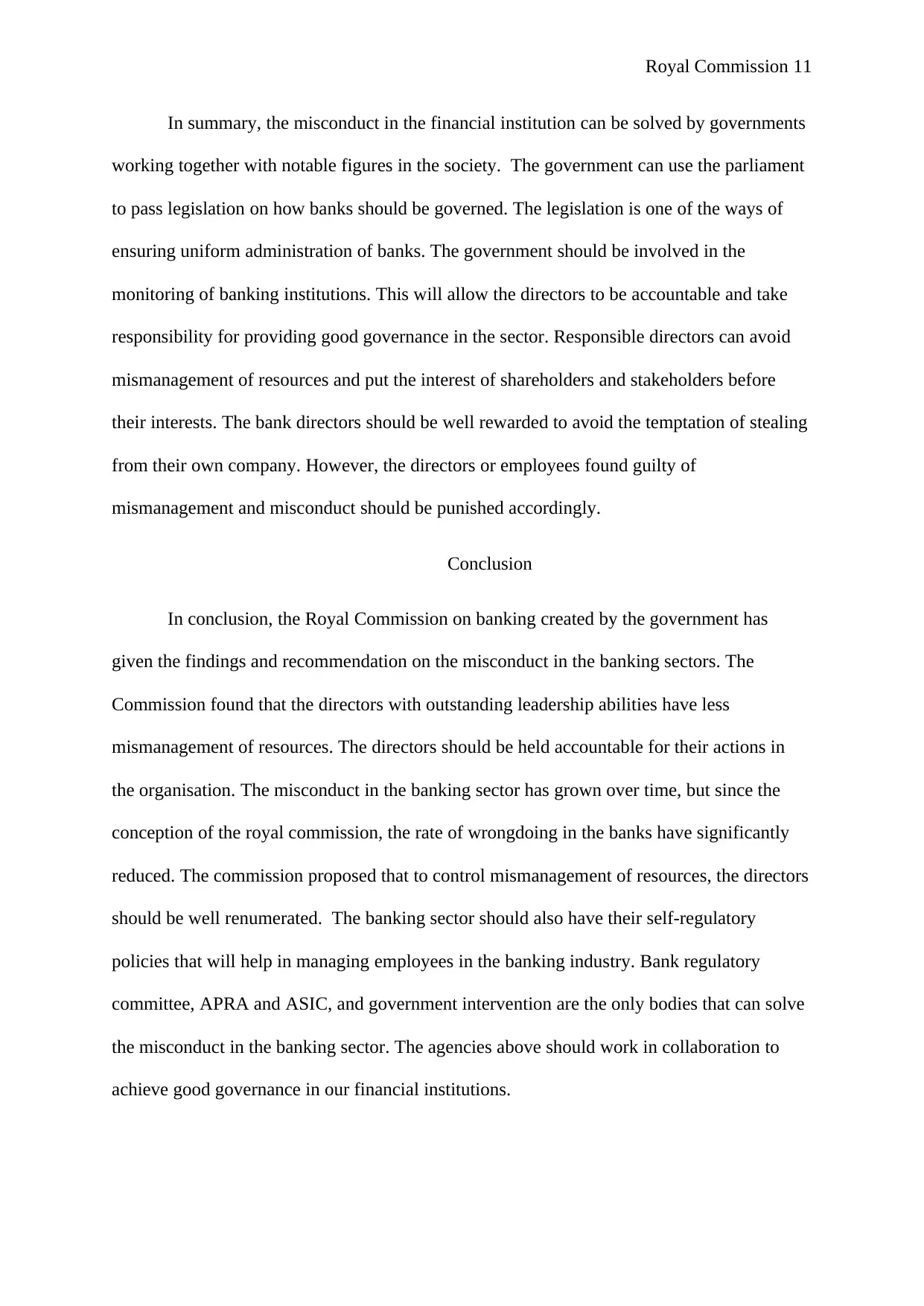
Royal Commission 11
In summary, the misconduct in the financial institution can be solved by governments
working together with notable figures in the society. The government can use the parliament
to pass legislation on how banks should be governed. The legislation is one of the ways of
ensuring uniform administration of banks. The government should be involved in the
monitoring of banking institutions. This will allow the directors to be accountable and take
responsibility for providing good governance in the sector. Responsible directors can avoid
mismanagement of resources and put the interest of shareholders and stakeholders before
their interests. The bank directors should be well rewarded to avoid the temptation of stealing
from their own company. However, the directors or employees found guilty of
mismanagement and misconduct should be punished accordingly.
Conclusion
In conclusion, the Royal Commission on banking created by the government has
given the findings and recommendation on the misconduct in the banking sectors. The
Commission found that the directors with outstanding leadership abilities have less
mismanagement of resources. The directors should be held accountable for their actions in
the organisation. The misconduct in the banking sector has grown over time, but since the
conception of the royal commission, the rate of wrongdoing in the banks have significantly
reduced. The commission proposed that to control mismanagement of resources, the directors
should be well renumerated. The banking sector should also have their self-regulatory
policies that will help in managing employees in the banking industry. Bank regulatory
committee, APRA and ASIC, and government intervention are the only bodies that can solve
the misconduct in the banking sector. The agencies above should work in collaboration to
achieve good governance in our financial institutions.
In summary, the misconduct in the financial institution can be solved by governments
working together with notable figures in the society. The government can use the parliament
to pass legislation on how banks should be governed. The legislation is one of the ways of
ensuring uniform administration of banks. The government should be involved in the
monitoring of banking institutions. This will allow the directors to be accountable and take
responsibility for providing good governance in the sector. Responsible directors can avoid
mismanagement of resources and put the interest of shareholders and stakeholders before
their interests. The bank directors should be well rewarded to avoid the temptation of stealing
from their own company. However, the directors or employees found guilty of
mismanagement and misconduct should be punished accordingly.
Conclusion
In conclusion, the Royal Commission on banking created by the government has
given the findings and recommendation on the misconduct in the banking sectors. The
Commission found that the directors with outstanding leadership abilities have less
mismanagement of resources. The directors should be held accountable for their actions in
the organisation. The misconduct in the banking sector has grown over time, but since the
conception of the royal commission, the rate of wrongdoing in the banks have significantly
reduced. The commission proposed that to control mismanagement of resources, the directors
should be well renumerated. The banking sector should also have their self-regulatory
policies that will help in managing employees in the banking industry. Bank regulatory
committee, APRA and ASIC, and government intervention are the only bodies that can solve
the misconduct in the banking sector. The agencies above should work in collaboration to
achieve good governance in our financial institutions.
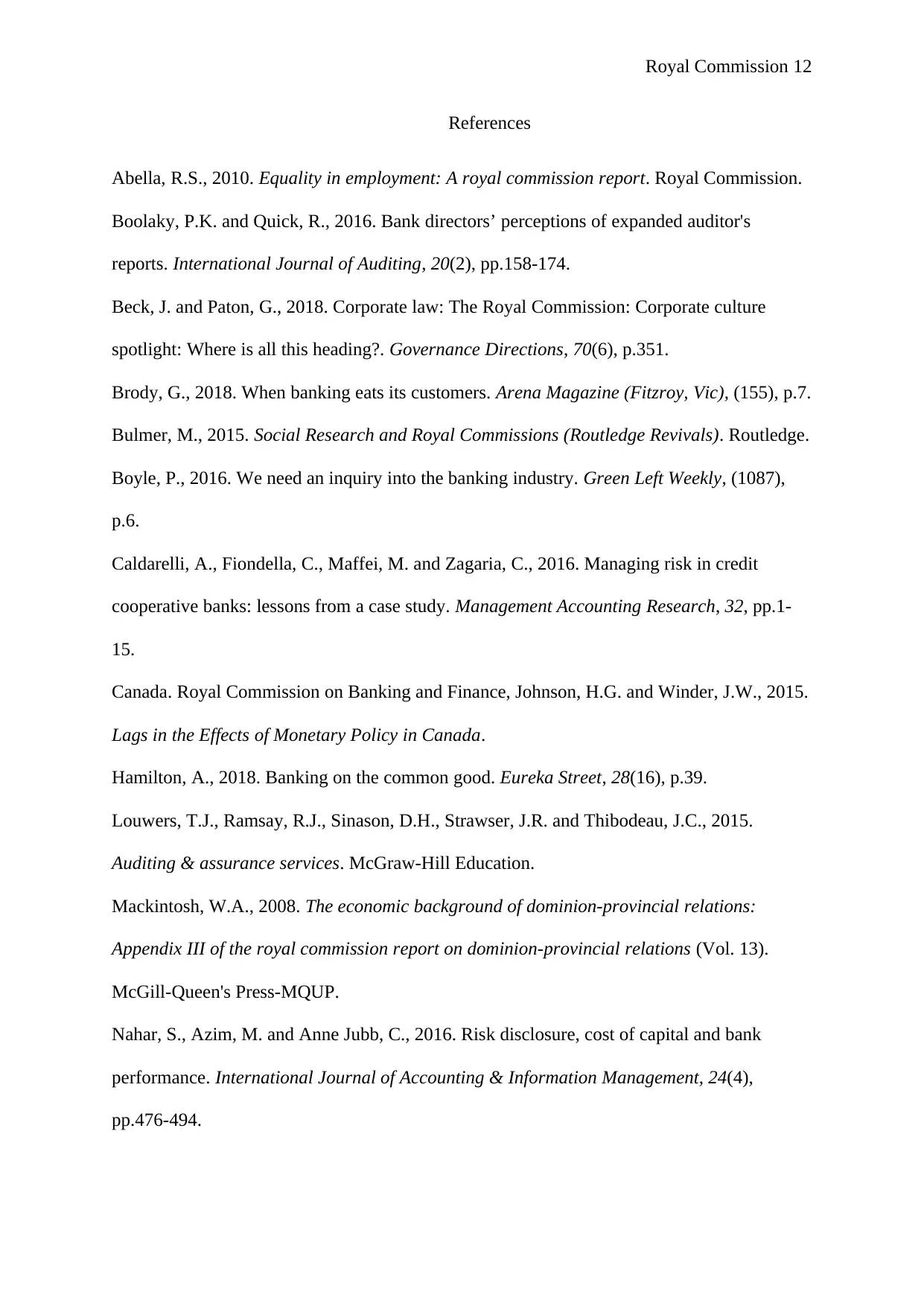
Royal Commission 12
References
Abella, R.S., 2010. Equality in employment: A royal commission report. Royal Commission.
Boolaky, P.K. and Quick, R., 2016. Bank directors’ perceptions of expanded auditor's
reports. International Journal of Auditing, 20(2), pp.158-174.
Beck, J. and Paton, G., 2018. Corporate law: The Royal Commission: Corporate culture
spotlight: Where is all this heading?. Governance Directions, 70(6), p.351.
Brody, G., 2018. When banking eats its customers. Arena Magazine (Fitzroy, Vic), (155), p.7.
Bulmer, M., 2015. Social Research and Royal Commissions (Routledge Revivals). Routledge.
Boyle, P., 2016. We need an inquiry into the banking industry. Green Left Weekly, (1087),
p.6.
Caldarelli, A., Fiondella, C., Maffei, M. and Zagaria, C., 2016. Managing risk in credit
cooperative banks: lessons from a case study. Management Accounting Research, 32, pp.1-
15.
Canada. Royal Commission on Banking and Finance, Johnson, H.G. and Winder, J.W., 2015.
Lags in the Effects of Monetary Policy in Canada.
Hamilton, A., 2018. Banking on the common good. Eureka Street, 28(16), p.39.
Louwers, T.J., Ramsay, R.J., Sinason, D.H., Strawser, J.R. and Thibodeau, J.C., 2015.
Auditing & assurance services. McGraw-Hill Education.
Mackintosh, W.A., 2008. The economic background of dominion-provincial relations:
Appendix III of the royal commission report on dominion-provincial relations (Vol. 13).
McGill-Queen's Press-MQUP.
Nahar, S., Azim, M. and Anne Jubb, C., 2016. Risk disclosure, cost of capital and bank
performance. International Journal of Accounting & Information Management, 24(4),
pp.476-494.
References
Abella, R.S., 2010. Equality in employment: A royal commission report. Royal Commission.
Boolaky, P.K. and Quick, R., 2016. Bank directors’ perceptions of expanded auditor's
reports. International Journal of Auditing, 20(2), pp.158-174.
Beck, J. and Paton, G., 2018. Corporate law: The Royal Commission: Corporate culture
spotlight: Where is all this heading?. Governance Directions, 70(6), p.351.
Brody, G., 2018. When banking eats its customers. Arena Magazine (Fitzroy, Vic), (155), p.7.
Bulmer, M., 2015. Social Research and Royal Commissions (Routledge Revivals). Routledge.
Boyle, P., 2016. We need an inquiry into the banking industry. Green Left Weekly, (1087),
p.6.
Caldarelli, A., Fiondella, C., Maffei, M. and Zagaria, C., 2016. Managing risk in credit
cooperative banks: lessons from a case study. Management Accounting Research, 32, pp.1-
15.
Canada. Royal Commission on Banking and Finance, Johnson, H.G. and Winder, J.W., 2015.
Lags in the Effects of Monetary Policy in Canada.
Hamilton, A., 2018. Banking on the common good. Eureka Street, 28(16), p.39.
Louwers, T.J., Ramsay, R.J., Sinason, D.H., Strawser, J.R. and Thibodeau, J.C., 2015.
Auditing & assurance services. McGraw-Hill Education.
Mackintosh, W.A., 2008. The economic background of dominion-provincial relations:
Appendix III of the royal commission report on dominion-provincial relations (Vol. 13).
McGill-Queen's Press-MQUP.
Nahar, S., Azim, M. and Anne Jubb, C., 2016. Risk disclosure, cost of capital and bank
performance. International Journal of Accounting & Information Management, 24(4),
pp.476-494.
⊘ This is a preview!⊘
Do you want full access?
Subscribe today to unlock all pages.

Trusted by 1+ million students worldwide
1 out of 13
Related Documents
Your All-in-One AI-Powered Toolkit for Academic Success.
+13062052269
info@desklib.com
Available 24*7 on WhatsApp / Email
![[object Object]](/_next/static/media/star-bottom.7253800d.svg)
Unlock your academic potential
Copyright © 2020–2026 A2Z Services. All Rights Reserved. Developed and managed by ZUCOL.





